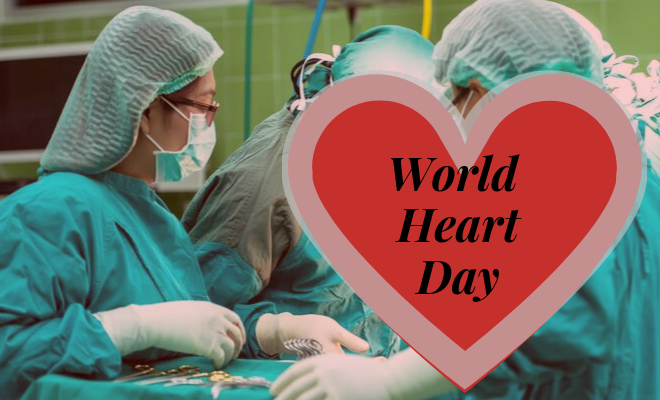Satkam Divya
Heart palpitations occur when your heart is skipping beats or you get to feel a racing pulse in your neck and chest. Stress or an intense workout can lead to heart palpitations. There is nothing much to worry about as there are many ways to tackle the problem. You will not encounter it for a longer period as the racing heartbeat will only last for a few seconds. But what matters is how you take care of yourself when your heart is fluttering.
Quick action is always wise to avoid any mishap. In some scenarios, it might be a cause for any serious underlying illness such as arrhythmia which needs immediate medical attention. A doctor can be consulted for treatment as well. Home remedies can easily help you to treat your racing heartbeat. There are many underlying causes as well that trigger heart fluttering like anxiety or panic attacks, fever, acid flux or gas, hormonal changes, depression, increased level of stress or workouts.

Know the simple home remedies to cure your fluttering sensations.
1. Deep breathing: First of all, as soon as you feel the sensation of irregular heartbeat, sit down quickly. Sit straight by propping up your feet and try to breathe slowly with small deep breathes. This posture will let your belly expand with each inhalation. Keep your focus on slow breathing only. It will eventually calm your heartbeat and you will return to your normal breathing.
2. Valsalva maneuver: Try Valsalva maneuver technique as well if you are not able to stop your racing heartbeat. In this, you need to pinch your nose while keeping your mouth closed and try to exhale. But you can’t exhale as you have now blocked your nose and mouth, so it will force a bowel movement inside your body. As a result, your blood pressure will increase for few seconds which will bring down your heartbeat to normal.
3. Forceful coughing: Another similar technique includes forceful coughing. Force yourself to cough which will increase pressure inside your chest. This trick also works most of the times to calm your heart palpitations.
4. You can also hold your knees up pressing against your chest. It will create pressure and help you to breathe slowly.
5. Drink water: Taking a few sips of icy cold water also helps to calm your flutter. For a few people drinking water instantly stops their racing heartbeat. It varies from person to person, for few it might take sometime after gulping cold water.
Drinking water will help you to keep yourself hydrated. Many times, after an intense workout your body dehydrates leading to sudden heart palpitations. Small amount of water will work wonders in reducing your physiological stress and enhance your breathing rate to normalcy.
6. Intake of electrolyte drinks: Consumption of electrolyte drinks such as coconut water, ORS, sports drinks, etc. will restore your normal breathing. Electrolyte drinks contain essential minerals such as sodium and potassium required by your body. Next time when you experience a racing heartbeat, drink electrolyte liquid. It works like magic in your body, so always carry an electrolyte drink with you in times of emergency.
7. Less consumption of stimulants: There are many stimulants that are more likely to affect your health through a racing heartbeat. Avoiding such foods will be good for anyone who is experiencing sudden heart palpitations. Tobacco products, caffeinated beverages, excessive intake of alcohol, appetite suppressants, high blood pressure medicines, medications treating mental illness, drugs like cocaine, methamphetamines etc.
8. Follow a healthy diet with regular exercise: There are fewer chances for a healthy person to go through sudden fluttering of the heartbeat. A regular exercise is always advised for everyone to keep themselves fit. The best way to be anxiety and stress-free is through a daily 30 to 60-minute exercise. Exercise benefits you in always being active and healthy.
While a balanced diet always keeps you away from a lot of illness or diseases. A healthy diet containing foods such as fresh and seasonal fruits and vegetables will keep your heart healthy. Try foods that trigger your heartbeat. Foods with high sodium like canned or processed foods, spicy foods, chocolates, Fried foods are to be avoided.
If at any point you feel you need to get diagnosed by a doctor and if the doctor feels your heart palpitations might have any serious underlying cause, these are the tests you will be advised.
Type of tests
* Electrocardiogram (ECG) will help your doctor to diagnose any irregularities related to your heart. The test is performed while you are resting or through an exercise.
* Holter monitoring is a device for recording the status of ECG. It usually counts the period between 24 to 72 hours. This device helps to detect irregular heartbeat that is sometimes missed during ECG.
* Event Recording is worn throughout the day. Hence, after wearing it you need to push the recording button of the device whenever you get the sensation of a fast heartbeat. From its result, your doctor can monitor the changes that have occurred in your heart. In a few cases, you might even need to wear it for several weeks as per doctor’s advice. The echocardiogram is a method to examine your chest through an ultrasound. The detailed images let your doctor diagnose your heart’s function and structure.
Depending on the test results, your doctor will suggest a treatment if required.
Mr Satkam Divya is CEO, KlinicApp

